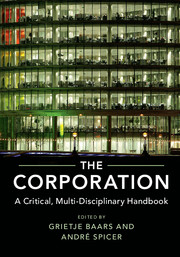Book contents
- Frontmatter
- Contents
- List of Contributors
- Acknowledgements
- Introduction: Why the Corporation?
- PART I DISCIPLINARY OVERVIEWS
- 1 The Corporation in History
- 2 The Corporation in Legal Studies
- 3 The Corporation in Economics
- 4 The Corporation in Sociology
- 5 The Corporation in Anthropology
- 6 The Corporation in Political Science
- 7 The Corporation in Geography
- 8 The Corporation in Accounting
- 9 The Corporation in Management Studies
- PART II INTERDISCIPLINARY THEMATIC CHAPTERS
- 1 The Evolution of the Corporate Form
- 2 The Multinational Corporate Group
- 3 The Financialization of the Corporation
- 4 Corporate Value Chains
- 5 Corporate Citizenship
- 6 The Corporation and Crime
- 7 The Corporation and Ideology
- 8 Corporation and Communities
- 9 Corporations and Resistance
- 10 Alternatives to the Corporation
- Index
- References
9 - The Corporation in Management Studies
from PART I - DISCIPLINARY OVERVIEWS
Published online by Cambridge University Press: 31 March 2017
- Frontmatter
- Contents
- List of Contributors
- Acknowledgements
- Introduction: Why the Corporation?
- PART I DISCIPLINARY OVERVIEWS
- 1 The Corporation in History
- 2 The Corporation in Legal Studies
- 3 The Corporation in Economics
- 4 The Corporation in Sociology
- 5 The Corporation in Anthropology
- 6 The Corporation in Political Science
- 7 The Corporation in Geography
- 8 The Corporation in Accounting
- 9 The Corporation in Management Studies
- PART II INTERDISCIPLINARY THEMATIC CHAPTERS
- 1 The Evolution of the Corporate Form
- 2 The Multinational Corporate Group
- 3 The Financialization of the Corporation
- 4 Corporate Value Chains
- 5 Corporate Citizenship
- 6 The Corporation and Crime
- 7 The Corporation and Ideology
- 8 Corporation and Communities
- 9 Corporations and Resistance
- 10 Alternatives to the Corporation
- Index
- References
Summary
Introduction
‘Management’ – as practised in modern corporations as well as the social position ascribed to its exponents – is today comparatively well established and institutionalized. For Berle and Means (1968 [1932]: 196), ‘“[m]anagement” may be defined as that body of men who, in law, have formally assumed the duties of exercising domination over the corporate business and assets’. ‘Management’ has not, however, always been so taken for granted (Pollard, 1968; Storey, 1983); and, as we shall show, its theory and practice remain a product of struggles between parties, including legislators and owners as well as executives, who seek to press their distinctive claims upon the purpose and scope of management. At the centre of these struggles is this question: what benefits does ‘management’ bring, and to whom?
Historically, as we will show, modern management is directly related to the emergence of the modern corporate form, providing a changing ‘figure’ located within the shifting ‘ground’ of the corporate form that has been recast within different phases of capitalist development. In Section 1 of this chapter, we show how, during the nineteenth century, the public limited liability company as a legal entity emerged, in the US and the UK, as a new organizational form that stood over and against the partnership. The transfer of ‘ownership’ of corporate assets from shareholders to this separate legal entity simultaneously bestowed considerable privileges and protections upon shareholders – such as perpetuity, limited liability and liquid share trading – as part of a legal quid pro quo. The quid pro quo also opened up a legal space that enabled shareholders to relinquish the taxing and restrictive demands of direct oversight and control. Recasting shareholders as well-protected investors in coupons, or owners of ‘tokens’ as Berle and Means (1968 [1932]) call them, vacated the terrain of control previously occupied and organized by partner-shareholders. This shift also enabled salaried managers to enter a space in which they have come to exercise discretion in determining and implementing corporate strategy. As we will show, the purpose and scope of that discretion has been a matter of contestation, especially with regard to the interpretation of their fiduciary duties toward ‘the corporation’.
- Type
- Chapter
- Information
- The CorporationA Critical, Multi-Disciplinary Handbook, pp. 197 - 212Publisher: Cambridge University PressPrint publication year: 2017
References
- 2
- Cited by



